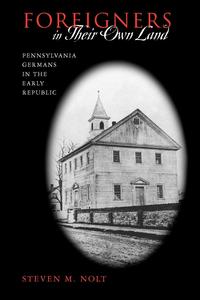Nolt provides the first truly comprehensive study of the largest non-English-speaking white ethnic group in the early United States. He is the first to trace developments among the German Lutherans and Reformed from the 1780s to the 1850s, and he has explored many little-known unpublished and published materials by largely forgotten writers. Foreigners in Their Own Land is full of historical detail that should be new even to most specialists in the field.-Mark Haberlein, University of Freiburg, GermanyHistorians of the early Republic are just beginning to tell the stories of the period"s ethnic minorities. In Foreigners in Their Own Land, Steven M. Nolt is the first to add the story of the Pennsylvania Germans to that larger mosaic, showing how they came to think of themselves as quintessential Americans and simultaneously constructed a durable sense of ethnicity. The Pennsylvania German Lutheran and Reformed populations of eastern Pennsylvania, Maryland, and the Appalachian backcountry successfully combined elements of their Old World tradition with several emerging versions of national identity. Many took up democratic populist rhetoric to defend local cultural particularity and ethnic separatism. Others wedded certain American notions of reform and national purpose to Continental traditions of clerical authority and idealized German virtues. Their experience illustrates how creating and defending an ethnic identity can itself be a way of becoming American. Though they would maintain a remarkably stable and identifiable subculture well into the twentieth century, Pennsylvania Germans were, even by the eve of the Civil War, the most "inside" of "outsiders." They represent the complex and often paradoxical ways in which many Americans have managed the process of assimilation to their own advantage. Given their pioneering role in that process, their story illuminates the path that other immigrants and ethnic Americans would travel in the decades to follow. Это и многое другое вы найдете в книге Foreigners in Their Own Land (Steven M. Nolt)
Foreigners in Their Own Land Steven M. Nolt
Подробная информация о книге «Foreigners in Their Own Land Steven M. Nolt». Сайт не предоставляет возможности читать онлайн или скачать бесплатно книгу «Foreigners in Their Own Land Steven M. Nolt»
